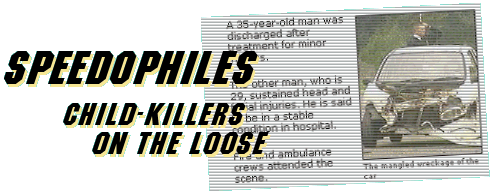But paedophiles are by no means alone in taking young lives and inflicting irreparable damage. Some 1,200 road deaths a year and 100,000 injuries are attributed to speed. A survey from the Department of Transport, published last week, found that 56% of respondents admitted exceeding 70mph limits on open roads. On urban roads with a 30mph limit, two-thirds - including 45% of those at the wheels of heavy goods lorries - ignored the limit. The only surprise in these figures is that, observing our roads, one would have guessed the rate of offending was nearer 90%.
That is one reason why 5,000 non-drivers die on our roads every year; and why, though our roads are the safest in the EU, our rate of child pedestrians killed is the worst: 1.3 per 100,000, against 1.0 in France and Germany and 0.7 in Italy, even. Most adults know there are speedophiles round the corner. Too many children don't. Last year there were 103 child pedestrians killed on the roads of Britain. Speed will have had some part in many such tragedies. The average number of children abucted and killed by strangers is seven a year.
Many speedophiles will find this comparison vile. Paedophiles, they will say, are disgusting, alien perverts: they themselves are decent people, as devoted to law and order as anyone, and in general the kind of model citizens who make Britain the nation it is. Some blame the law for demanding a degree of restraint that is simply impossible: why should people feel bound to obey ridiculous laws? Others admit that they just can't resist temptation. Perhaps they're just made that way. "There are a great many men around," one speedophilospher writes in his Sunday Times column, "and I'm happy to say a few women too, who enjoy the thrill that can be provided by a big, fast powerful car." "On quiet roads," Jeremy Clarkson has also confessed, "I drive at speeds that scientists call 'very fast' and I still corner with the vigour and panache of a 13th-century horseman."
It's his chemistry, you see. Young men, he explains, have very low levels of monoamine oxidase, a brain enzyme of which the old have much more, making them more careful. So next time you see a child mown down by a speedophile, don't blame the driver; it's all the fault of his enzymes. Alternatively, accidents featuring speedophiles are caused by other road users who don't have their expertise. Especially elderly pootlers with copious nose hair: they are the ones who cause accidents. Speedophiles know what they're doing, so don't.
Paedophilia has no equivalent figure to Clarkson. No padeophile is given a regular column or TV show to popularise his passion. Nor is paedophilia boosted, as speedophilia is, by vastly expensive ad campaigns equating fast cars with power and sexual success, an agency to transform your ordinary low-enzyme lad into as daring a hero as the Campbells on Coniston, or Rubens Barrichello powering through the chicanes. And anyway, what is a world without risk? It's a world fit only for wimps. Except that in this case, the risk extends to their victims.
We used to have a problem like this with drivers who drank. Everyone did it. Everyone liked "one more for the road". Those who got caught were simply unlucky; only the prissy held it against them. All that changed in the mid-60s when Barbara Castle brought in the breathalyser. There were furious complaints in parliament, and even more venomous protests outside it, against this evil socialist plot to curtail John Bull's traditional freedoms. When Castle came up on the screen in cinema newsreels audiences booed. Abusive letters poured in. "You have ball's our darts matches up," wrote a group who signed themselves "3 regulars". "So get out, you wicked old b*****." There were even one or two death threats. A year later, the department estimated that some 1,200 lives had been saved, against the predicted 200. The death toll on the roads had fallen by more than 20% in the first five months and continued to fall thereafter.
That happened, those lives were saved, because Barbara Castle had the guts to go through with what she knew to be necessary, and Harold Wilson, instead of consulting focus groups, unhesitatingly gave her his backing. That is where we want guts: in our ministers - not spewed all over our roads.







